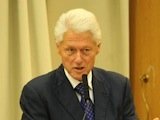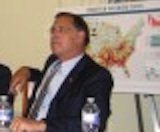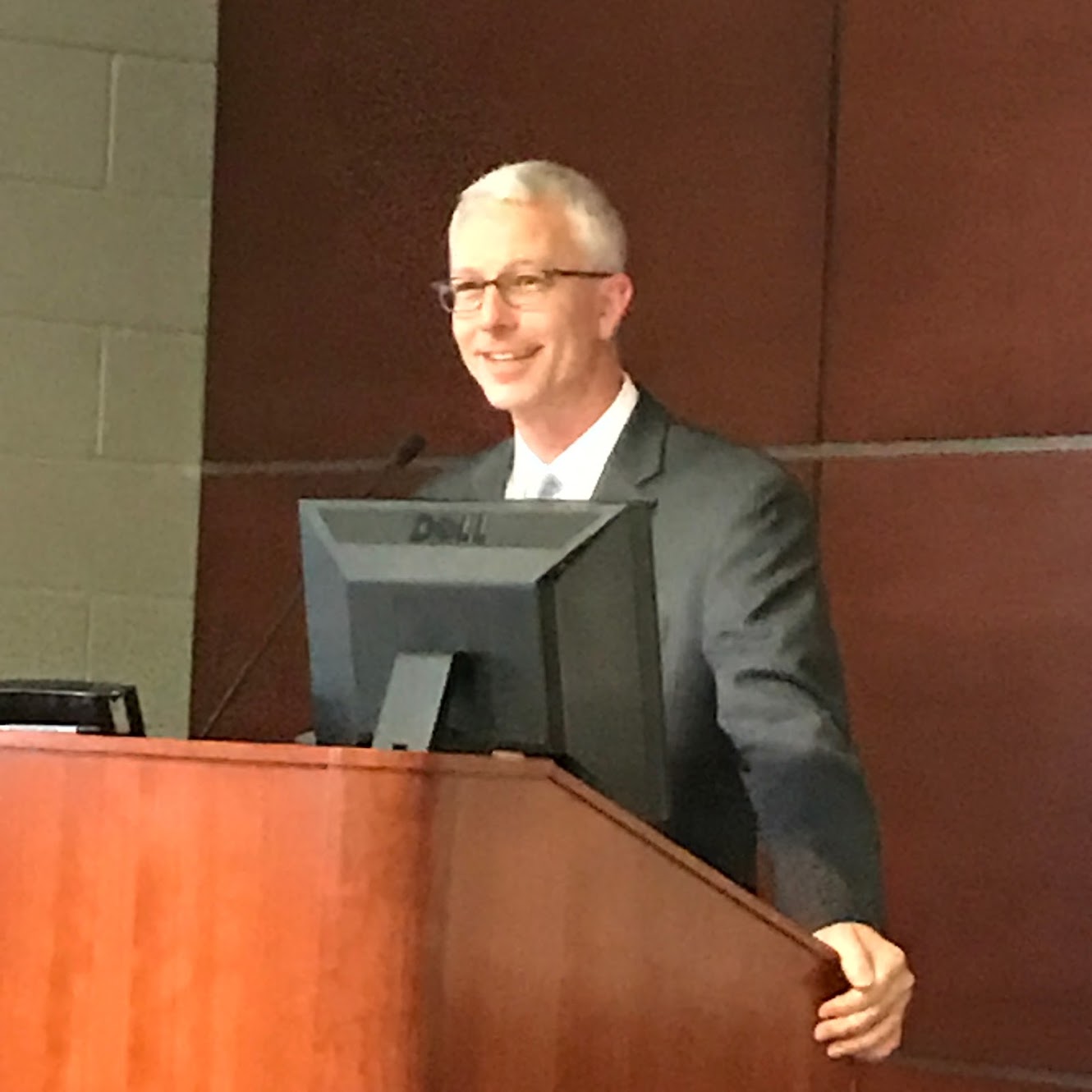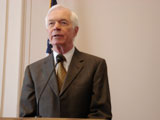Economic Equality Caucus
which advocates for economic equality across the USA.
| Home | Organizational Structure | State Coordinators | Executive Director | Caucus Articles | Memberships | |||||
| "Delta Vision, Delta Voices" | ||||||||||
|
Help Advocate for Economic Progress and Equality. Donate to the Delta Caucus/Economic Equality Caucus. |
||||||||||
Delta Grassroots Caucus Events

Credit Michael Hibblen/ KUAR News, Arkansas Public Radio; Former President Bill Clinton speaking to the Delta Grassroots Caucus on May 2, 2013, at the University of Arkansas Clinton School of Public Service, Little Rock

U. S. Senator John Boozman, Arkansas, at a Delta Grassroots Caucus meeting at the US Capitol

Brad Cole, Executive Director of the Municipal League of Illinois; previously a senior aide to former Republican US Sen. Mark Kirk of Illinois, earlier Mayor of Carbondale, Illinois, veteran Delta regional advocate, speaking at the Delta regional conference in West Memphis, Arkansas on April 26, 2019.

President Bill Clinton makes a comment to Delta Caucus Director Lee Powell at a meeting in Blytheville, Arkansas (in the northeast Arkansas Delta) on Nov. 2, 2014

The Delta Caucus would like to pay tribute to the late, great U.S. Sen. Thad Cochran of Mississippi, a powerful force in the US Senate for decades and a champion for the Delta. Sen. Cochran passed away on May 30, 2019. He spoke to the Delta Caucus on many occasions over the years (he is pictured above speaking to a Caucus event on Capitol Hill in Washington, DC) and his thoughtful, courteous and bipartisan leadership will be sorely missed.

Marcie Lawson, Executive Director, Sikeston, Missouri Regional Chamber and Area Economic Development Corporation, speaking at the Delta regional conference in West Memphis, Arkansas on April 26, 2019.

Alan Gumbel, Greater Memphis Alliance for a Competitive Workforce, Memphis, Tennessee, speaking at the Delta regional conference in West Memphis, Arkansas on April 26, 2019.

Mayor Shirley Washington of Pine Bluff, AR, speaking to the Delta Caucus at the Arkansas Capitol Rotunda in 2017.
Update from Second Harvest Food Bank of Greater New Orleans & Acadiana, June 1, 2021
Posted on June 01, 2021 at 02:10 PM
Update on Second Harvest Activities Regarding Hunger and Nutrition in Southern Louisiana
June 1, 2021
Editor’s note: This is an update about Second Harvest hunger and nutrition work in New Orleans and southern Louisiana from Paige Vance, Impact Operations Manager for Second Harvest Food Bank of Greater New Orleans and Acadiana. Ms. Vance was one of the speakers at the May 13, 2021 Delta Zoom Conference. Lee Powell, Delta Caucus Director (boldface in document are from the editor) (202) 360-6347
In a “normal” year, we fight hunger, which is a disaster by itself. According to Feeding America, there are 382,930 food insecure people residing in our 23 parish service area, which stretches from the MS State Line to the TX border.
The Dept of Agriculture reports that 1 in 5 Louisianians are unsure of where they will get their next meal. For children, that number increases to 1 in 3, which is up from 1 in 4. And then 2020 hit.
We are quite accustomed to Disaster Response between hurricanes and floods. 2020, however, was a disaster on steroids. The Pandemic impacted us, like everyone else, quite severely. The New Orleans economy is significantly based on tourism. Thousands upon thousands of our neighbors were suddenly unemployed and in need.
People who had never been concerned by a lack of food were suddenly unsure of where they would get their next meal. In the past, when we were in disaster mode, we were able to rely on partners who could assist from those areas that were unaffected. Suddenly we were alone without that network, because we were all in the same predicament; all of us facing an unrelenting demand for food and unable to assist any other Food Bank. And the long marathon of COVID response was punctuated at times with a Sprint as we responded to Hurricanes Laura, Delta and Zeta, as well as to this winter’s hard freeze.
We know that all storm clouds have silver linings, and for us this was no different. We were able to develop some amazing and unique partnerships, some of which were temporary, and some of which we hope will be permanent. In addition, we have thought of ways to deliver food that we had not done before.
As they always do, the government responded. They sent National Guard troops who were able to act as needed labor. They were also a presence of authority on the scene at mass distributions. USDA began the Coronavirus Food Assistance Program (CFAP) and sent food through distributors. They increased The Emergency Food Assistance Program (TEFAP) and added trade mitigation food as well. USDA also increased the SNAP benefits and eased the TEFAP application requirements, allowing for 2 distributions monthly.
The Health Department in LA was tracking the COVID diagnosed patients and contact tracing. As part of their interaction, they asked if the isolated or quarantined household needed food, so they would not go out into the community and potentially spread Coronavirus. Volunteers of America was their point of contact.
After a year, the VOA needed assistance and reached out to us to provide food and transportation of the product to the homes of the COVID exposed. We in turn partnered with Hands On NOLA, who had won a Door Dash Grant of over 5,000 free deliveries. There was a catch: (isn’t there always, though?) DoorDash only delivered within 10 miles of the pick up point, which had to be vetted to ensure there were restaurants and drivers in those areas. We identified a network of out partner agencies and dropped food off at their locations. While we had some partners in rural areas, Door Dash declined several due to a lack of drivers. This clustered partnership was able to deliver 153 boxes to 145 families in a 6 parish area between March 17th and May 11th of this year.
We were also able to partner with local government entities, from City Council members to Parish Presidents to mayors in order to distribute food to the areas they were able to identify as needing extra assistance.
We were able to offer direct assistance to our communities reeling from job loss and worry by setting up our own mass distributions through Parish properties as well as our warehouse. At one point we lost the use of all of these locations as the parishes were preparing for hurricanes and used those venues to stage emergency equipment. Not to be stopped in our mission, we then partnered with a movie theater to utilize their large parking lots early in the day and avoid their late movie starts. These mass distributions had to follow COVID guidelines, so mask on, window up, and trunk popped were the orders of the day to provide contact free services. We were even able to use volunteers to assist those in their cars to apply for TEFAP product. This way we were able to get the CFAP, TEFAP and donated products to those in need in the most efficient method we were able to devise.
To get the food out on a more local level, we utilized our relationships with our partners and sent CFAP trucks directly to those communities. Through these 262 CFAP distributions, we were able to distribute an estimated 1,008,807 boxes with a combined weight of 19,847,807 pounds of food.
Our kitchens in New Orleans and Lafayette, St. Joe’s Diner, went into meal production as another response to the pandemic. Normally, the kitchen prepares meals for after school programs, but school was not in session. 500 meals were sent daily to Senior housing developments to prevent the seniors, who were particularly vulnerable to the virus, from having to grocery shop. These deliveries are ongoing as we are utilizing disaster funding to continue for as long as possible.
Our New Orleans kitchen also fed breakfast and lunch to 124 vulnerable senior Hurricane Laura evacuees housed in 2 hotels on Canal Street. On the weekends and holidays, a partner Soup Kitchen provided meals and Hands On helped provide DoorDash drivers to deliver them. St Joe’s Diner was able to partner with the Calcasieu Department on Aging to deliver Meals on Wheels delivering 1981 meals weekly, which has increased to 2331 currently.
When the hurricanes struck, production for the survivors and evacuees increased. These kitchens combined have delivered over 1 million meals to senior residential facilities, children’s programs, grab and go meal sites, and other locations, including shelters operated by the Red Cross. At the peak or disaster response, over 10,000 meals were being prepared daily.
We became a hub of information for some of our partners. The Fight Is In Us campaign asked if we could spread the word on their campaign to collect plasma from recovering COVID patients to use in treatment for those who were afflicted the worst by the virus. We distributed over 1,000 of their flyers to our agencies and clients. They were able to collect over 650,000 units of plasma and delivered more than 600,000 of them to patients fighting COVID and also led to the discovery of important COVID-19 research insights. We were just a trickle in those numbers, but this partnership lent to what will hopefully prove to be the slowing and eventual stopping of the pandemic. We also disseminated SNAP information and encouraged those unfamiliar with the program to apply and see fi they could get the supplemental assistance offered.
As time passed, and the vaccines were made more readily available, we partnered with Ochsner Health Systems and provide them with our monthly list of distributions through our partners so they can go and assist. We were stopped for a time as Johnson and Johnson is the preferred vaccine so no 2nd shots are needed. But they are back on track. The United Way is sponsoring a vaccination/food give away partnership starting next week where they are distributing 1500 boxes of food and shots for 6 weeks at 4 different sites.
Another group, Community Organized Relief Effort (CORE) has reached out as well, and we are planning to move forward with them as well. This food and vaccination partnership is allowing the health care field to go to people in their communities and target those who are the most likely to be concerned about and fearful of the vaccine and reach them where they are to allay their fears and hopefully vaccinate them as we move 1 step closer to herd immunity, and the recovery of our entire community.
We know the economic recovery is a different story. Feeding America is projecting that while the unemployment rate will reduce, poverty and child poverty rates will increase in 2021. It is anticipated that rural areas will be adversely impacted. We are strategizing to reach these communities and populations as well. We have started a Mobile Market in the rural communities around Lafayette where we provide fresh produced, sourced from local black and brown farmers at a rate where they are making a living wage and we can sell it at cost to folks in need cheaper than the supermarket. We are able to accept credit, cash and EBT payments as well.
We are piloting a Rural Accelerator initiative in St Landry Parish. There are several community leaders from cross sectors involved. The thought process is that work Force Development, Farmers Association, Health Care, Housing Authority, and Local Government representatives work together to problem solve the issues facing their community. This is an attempt to eradicate the factors perpetuating poverty. Food alone will not sure that ill.
These rural areas are often underserved because they are remote. We are developing a strategy to partner with more nontraditional entities, such as WalMart, Piggly Wiggly, or the local store to see if they would be willing to be a drop off point for clients we are serving directly rather than a partner agency. 2020 and so far 2021 have certainly been hard, but from this adversity, we are learning how needs are changing, and so how we need to develop and grow to continue to serve those who are most in need. And those in need can change in the blink of an eye when there is a natural or biological disaster. Whatever comes next, we will evolve to meet the challenge and serve the need where it exists.
Back to the top